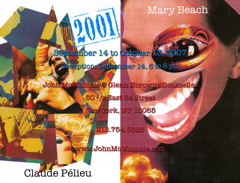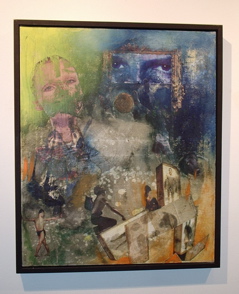Straight Up |: September 2007 Archives
 The posthumous show of collages by Mary Beach and Claude Pelieu -- now at John McWhinnie@Glenn Horowitz Bookseller through Oct. 13 on Manhattan's Upper East Side -- comes as something of a surprise. Their work is not high on the list of swank art collectors. Hell, I'd be surprised if it's on the list at all. And I don't think McWhinnie's appreciation will change that. As the former Newsweek art critic (and painter) Peter Plagens said to me about a Nelson Algren video I praised yesterday, "The trouble with being dead is you can't fight back against tributes people pay to you."
The posthumous show of collages by Mary Beach and Claude Pelieu -- now at John McWhinnie@Glenn Horowitz Bookseller through Oct. 13 on Manhattan's Upper East Side -- comes as something of a surprise. Their work is not high on the list of swank art collectors. Hell, I'd be surprised if it's on the list at all. And I don't think McWhinnie's appreciation will change that. As the former Newsweek art critic (and painter) Peter Plagens said to me about a Nelson Algren video I praised yesterday, "The trouble with being dead is you can't fight back against tributes people pay to you."
The show itself is eye-popping, however, and so is the gorgeously printed catalogue. Maybe that will bring on the collectors. I hope so. Of course, I'm partial to Mary and Claude. I knew them in San Francisco, back in the late '60s, when we created a little magazine together. They were doing collages then, too, though they weren't nearly as polished as these -- not even close. It seems to me that by 2001, the year almost all the collages in this show were executed, they had fully absorbed the influence of Norman O. Mustill (who also collaborated on the magazine).
 Mustill is not mentioned in McWhinnie's appreciation or in the catalogue or anywhere in the show itself. But I believe it was Mustill's work in the first place that turned Mary and Claude onto the method and style of the collages here. (They were so taken by his work that they commissioned an entire book of his collages. It was called "Flypaper," and they published it in 1967 under their Beach Books imprint.) So this show may be regarded as an unspoken homage to Mustill. He's the ghost in their machine.
Mustill is not mentioned in McWhinnie's appreciation or in the catalogue or anywhere in the show itself. But I believe it was Mustill's work in the first place that turned Mary and Claude onto the method and style of the collages here. (They were so taken by his work that they commissioned an entire book of his collages. It was called "Flypaper," and they published it in 1967 under their Beach Books imprint.) So this show may be regarded as an unspoken homage to Mustill. He's the ghost in their machine.
This is not to say the furious accomplishment of the "2001" collages is not their own. Mary, who died in 2006, had already been a painter many years before meeting Mustill, and it's evident. Her collages, along with a handful of paintings also on exhibit (like the one above), are more freewheeling, less "designed" than Claude's. Claude, who died in 2002, was first and foremost a writer. A prolific one. He was large in everything he did. And this show, though it only scratches the surface of his output, indicates how prolific a collagist he became as well. And how proficient.
Speaking of prolific, proficient and accomplished . . . Ted Morgan, author of more than a dozen books -- including biographies of Churchill, FDR, Somerset Maugham and, not least, William S. Burroughs -- was at the show's Sept. 14 opening. (So were rockers Grant Hart and Thurston Moore, and poet-photographer Gerard Malanga.)
When he met Pelieu in 1970, in London, Morgan recalled, they used to swap stories about the French Army. Morgan had served as an intelligence officer in Algiers. (See his latest book, the memoir "My Battle of Algiers," a swift, informative and, despite the subject, entertaining read.) "Pelieu was an army deserter," he said. "Claude was full of funny stories. We laughed like crazy. "
![Nelson Algren mug shot, Jan. 13, 1967 [Chicago Police Department]](http://www.artsjournal.com/herman/AlgrenMugshotsepia240.jpg) Dunno know why it took me so long to catch up with "Nelson Algren's Last Night!" Made by Warren Leming and Carmine Cervi, it's a beautiful video that runs for just over 5 minutes but with a long-lasting eloquence that matches its subject's words.
Dunno know why it took me so long to catch up with "Nelson Algren's Last Night!" Made by Warren Leming and Carmine Cervi, it's a beautiful video that runs for just over 5 minutes but with a long-lasting eloquence that matches its subject's words.
Such as these:
I submit that literature is made upon any occasion that a challenge is put to the legal apparatus by a conscience in touch with humanity.Now we all know.
... The hard necessity of bringing the judge on the bench down into the dock has been the peculiar responsibility of the writer in all ages of man.
-- Nelson Algren, Chicago: City on the Make
(from the introduction to the 1961 edition dedicated to Joan Baez)
 Meanwhile, per World Can't Wait:
Meanwhile, per World Can't Wait:
Today a belligerent President Bush comes to the United Nations to impress upon the world that the U.S. is in the Middle East to stay, that the war on terror will be endless, and to threaten a murderous war on Iran."That which you will not resist and mobilize to stop, you will learn or be forced to accept." If you don't show your resistance, it doesn't count.
As the man said, Now we all know.
Paul Krugman's column this morning warns us not to put any credence in the claim Gen. Petraeus will make in his upcoming report to Congress "that the surge has reduced violence in Iraq." Excellent point. The column makes lots of excellent points -- like this one:
Oh, and by the way. Baghdad is undergoing ethnic cleansing, with Shiite militias driving Sunnis out of much of the city. And guess what? When a Sunni enclave is eliminated and the death toll in that district falls because there's nobody left to kill, that counts as progress by the Pentagon's metric.
You could argue with the headline "Time to Take a Stand." That time was long ago. So for the record, a few past reminders from this small corner of the world about genocide and ethnic cleansing in Iraq:
Hed: The Sunni Genocide, December 8, 2005.
Lede:
Now that Harold Pinter has given his Nobel Prize acceptance speech, he has also provided us with cover to post what may be the most incredible item -- truly the hardest to believe -- we've ever put up. It's not only about genocide, which we've written about before, it's about "the coming genocide of the Sunnis in Iraq," to quote a friend of ours, which will be committed by American proxies for a U.S. regime secretly bent on mass murder.
Hed: 'Ganda Machine Gears Up, on December 15, 2005.
Lede:
We have led a country to civil war in order to permanently weaken it. We have largely destroyed its cultural patrimony to erase its identity and autonomy. We have set up a potential genocide against our opponents. And now we step aside and claim we can't control what will happen.
Hed: Hidden in Plain Sight, on December 20, 2005.
Lede:
We've been banging on about the American strategy todemocratizeSalvadorize Iraq, as though the coming Sunni genocide is a revelation because a "U.S. regime secretly bent on mass murder" has proxies doing the dirty work. But all of this has been hidden in plain sight for so long -- in the mainstream media and elsewhere -- that we're shocked by our own naiveté.
Hed: Bold, Red-faced Contradictions, on February 21, 2006.
Lede:
Iraqi death squads doing America's dirty work? Why would you think that?
Hed: Loud Whispers, on December 17, 2006.
Lede:
Finally, an acknowledgment of Sunni genocide as the BananaRepublic's sub rosa policy in Iraq: "The Whispers and the Why Nots."
The jingoism implicit in daily life taints everything we say, let alone what we do. To use my friend Bill Osborne's term, we are all "Orwellian zombies." This includes even the most sincere opponents of the President With His Head Up His Ass and his regime of BananaRepublic war criminals.
Consider Chris Hedges, a former war correspondent. His loathing of war in general and the Iraq war in particular expressed by two of his books -- "War Is a Force That Gives Us Meaning," a cri de coeur, and the deadpan "What Every Person Should Know About War" -- would seem to place him above reproach.
Yet he, too, can't be excluded from the ranks of Orwellian zombies. His latest column, "The Next Quagmire," illustrates the point.
Poetry as Insurgent Art:I am signaling you through the flames. The North Pole is not where it used to be. Manifest Destiny is no longer manifest. Civilization self-destructs. The goddess Nemesis is knocking at the door...
What are poets for in such an age? What is the use of poetry? ...
The master class starts wars. The lower classes fight it. Governments lie. The voice of the government is often not the voice of the people.
Sites to See
AJ Blogs
AJBlogCentral | rssculture
Terry Teachout on the arts in New York City
Andrew Taylor on the business of arts & culture
rock culture approximately
Rebuilding Gulf Culture after Katrina
Douglas McLennan's blog
Art from the American Outback
John Rockwell on the arts
Jan Herman - arts, media & culture with 'tude
dance
Apollinaire Scherr talks about dance
Tobi Tobias on dance et al...
media
Jeff Weinstein's Cultural Mixology
Martha Bayles on Film...
music
Greg Sandow performs a book-in-progress
Howard Mandel's freelance Urban Improvisation
Focus on New Orleans. Jazz and Other Sounds
Exploring Orchestras w/ Henry Fogel
Kyle Gann on music after the fact
Doug Ramsey on Jazz and other matters...
Greg Sandow on the future of Classical Music
Norman Lebrecht on Shifting Sound Worlds
publishing
Jerome Weeks on Books
Scott McLemee on books, ideas & trash-culture ephemera
theatre
Elizabeth Zimmer on time-based art forms
visual
Public Art, Public Space
John Perreault's art diary
Lee Rosenbaum's Cultural Commentary
Tyler Green's modern & contemporary art blog
![Lawrence Ferlinghetti at City Lights Books [Photo: © 2007 City Lights]](http://www.citylights.com/html/images/ferlinghetti.jpg)
